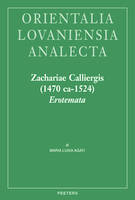- EAN13
- 9789042948143
- ISBN
- 978-90-429-4814-3
- Éditeur
- PEETERS
- Date de publication
- 12/04/2024
- Collection
- ORIENTALIA LOVA (321)
- Nombre de pages
- 326
- Dimensions
- 26 x 17,5 x 2,5 cm
- Poids
- 820 g
- Langue
- italien
- Fiches UNIMARC
- S'identifier
Zachariae Calliergis (1470ca-1524) Erotemata
Editio princeps. Con un'Introduzione sulla vita e attività dell'Autore
M.L. Agati
Peeters
Orientalia Lova
Offres
Viene per la prima volta editato uno dei testi grammaticali, reperiti dall’Autrice, composti dall’umanista cretese Zaccaria Callierge, copista e tipografo tra Venezia, Padova e Roma tra Quattrocento e Cinquecento. L’edizione diventa l’occasione per riprendere in maniera critica i fili della movimentata biografia e dell’attività professionale dell’autore, che si arricchisce del nuovo aspetto relativo alle sue straordinarie competenze sulla complessa tradizione grammaticale greca e bizantina. Viene tra l’altro approfondito il tema del rapporto, a Venezia, tra lui, la sua tipografia e quella celebre di Aldo Manuzio: gli indizi disponibili portano alla conclusione che, dato l’utile che culturalmente e filologicamente Manuzio ricavava da tutta la cerchia cretese per la stampa delle sue edizioni, verosimilmente per opportunismo egli evitò di fare loro una guerra di concorrenza. Ne risulta una monografia inedita che mette in più chiara luce una delle figure più poliedriche e interessanti nel panorama degli studi greci che la Caduta di Costantinopoli in mano ottomana portò in auge in Occidente. For the first time one of the grammatical texts found by the Author, composed by the Cretan humanist Zacharias Calliergis, copyist and typographer in Venice, Padua and Rome between the fifteenth and sixteenth centuries, is edited. The edition becomes an opportunity to critically resume the threads of the author's eventful biography and professional activity, which is enriched by the new aspect relating to his extraordinary skills on the complex Greek and Byzantine grammatical tradition. Among other things, the theme of the relationship between him, his typography and the famous one of Aldus Manutius in Venice is explored: the available clues lead to the conclusion that, given the profit that Manutius derived from the whole Cretan circle, culturally and philologically for the printing of his editions, probably out of opportunism he avoided waging a war of competition with them. The result is a new monograph that highlights one of the most multifaceted and interesting figures in the panorama of Greek studies that the Fall of Constantinople in Ottoman hands brought into vogue in the West.
S'identifier pour envoyer des commentaires.

